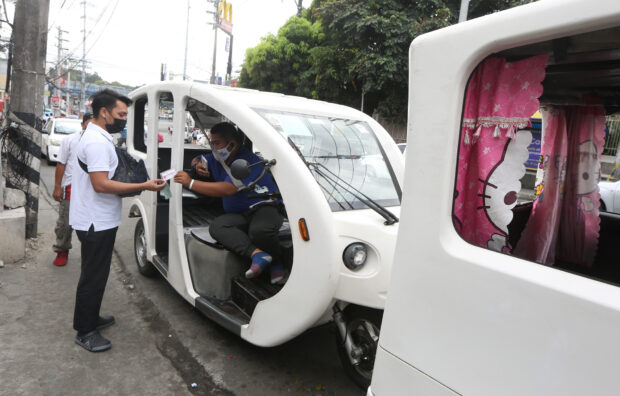Marcos seeks biz council’s input to make PH an EV hub

RIDING ON MOMENTUM | Citing the growing local demand for electronic vehicles, like this e-tricycle photographed in Tandang Sora, Quezon City, in January 2022, the government has asked for private sector recommendations on how the country can cash in, not just as a market but also as a producer. (Photo by NIÑO JESUS ORBETA / Philippine Daily Inquirer)
MANILA, Philippines — President Ferdinand Marcos Jr. wants the Philippines to be a major player in the global electric vehicle (EV) industry, citing the country’s potential to be a production hub.
In his meeting with the job sector cluster of the Private Sector Advisory Council Job Sector Group (PSAC-JSG) in Malacañang on Thursday, the president told the business leaders that the Philippines was becoming part of the global manufacturing chain for EVs and noted the increasing local demand for green vehicles.
To help keep the sales momentum going, Marcos in January signed Executive Order No. 12, which temporarily exempted from import tariffs certain e-vehicles, such as passenger cars, buses, minibuses, vans, trucks, motorcycles, tricycles, scooters, and bicycles.
List down proposals
Under the directive, import tariffs on some of their automotive parts were also either lowered or removed for the next five years, coming from previous rates ranging from 5 percent to 30 percent.
During the Aug. 17 meeting with PSAC-JSG, the president asked the council to submit a complete list of proposals for the further development of the EV industry in the country, according to Presidential Communications Secretary Cheloy Velicaria-Garafil.
Article continues after this advertisement“The PSAC-JSG made a commitment to study the proposal further and to continue working with their consultants to provide the President with a better plan,” Garafil said.
Article continues after this advertisementExpected shift
PSAC is a group of business leaders created by Marcos to help his administration in fulfilling the government’s economic goals.
Private sector leaders present during the meeting were Sabin Aboitiz of the Aboitiz Equity Ventures Inc., Joey Concepcion III of RFM Corp., Alfredo Ayala of AC Education Inc., Rizalina Mantaring of Ayala Corp., Kevin Tan of Alliance Global Inc., Doris Magsaysay-Ho of the Magsaysay Group of Companies, and Teresita Sy-Coson of SM Investments Corp.
Garafil said the PSAC-JSG recommended conducting data-driven case studies for top opportunities in the EV value chain.
“Among the council’s new recommendations are supporting the government’s thrust in EV manufacturing with a proposal to look into 17 downstream and upstream industry development opportunities, including mining in the EV value chain,” she said.
According to Garafil, EV sales are expected to overtake non-EV sales globally by 2026, “deeply reshaping a century-old industry.”
Locally made parts
As EV adoption rises, many vehicle parts will remain but some of the costliest components would be replaced, she said. Garafil cited that seven of 18 common automotive components of a vehicle are being produced in the Philippines, with one of four internal combustion engine (ICE)-specific components locally made.
She said that in the Philippines, there were huge opportunities in the expansion of copper mining and refining, copper-heavy component manufacturing, expansion in electrical component manufacturing, software development as well as delivery centers.
The Philippines, Garafil said, ranked fourth in copper reserves globally, with three plants set to increase production tenfold by 2027.
The country is also one of the world’s largest producers of nickel, another component that is vital in the production of the batteries used in EVs.
Tax breaks
The Department of Energy said it hoped that two- and three-wheeled EVs would continue to be allowed to enter the country tax-free.
Patrick Aquino, the director of the government agency’s Energy Resource Development Bureau, told reporters that the agency supported the inclusion of this EV segment in the government’s tax policy direction on EVs given that these were more accessible to Filipinos.
“We are looking at a bigger number in terms of legal registration to come from two- and three-wheelers,” Aquino told reporters last week during the press conference for the upcoming Philippine Electric Vehicle Summit (PEVS) 2023 in October.
Growing market
According to data from the Land Transportation Office, e-motorcycles and e-tricycles made up 83.8 percent of the total EVs in the country as of 2022.
To date, there are more than 16,000 EV units in the Philippines, according to statistics from the Electric Vehicle Association of the Philippines (eVAP). Sales of EVs in the local market grew nearly six times during the first quarter of 2023 compared to last year, according to the business group.
The number of units sold reached 2,536, partly due to the friendlier tax regime plus, decreasing prices of the EVs plus increasing preference for a more environment-friendly lifestyle. The end-March number marked a 495.3-percent growth compared to the 426 EV units sold for the whole of 2022.
According to eVAP, the number of EVs in the Philippines is projected to grow to as many as 6.61 million units by 2030, with two-wheeled vehicles, such as e-motorcycles, still comprising the majority of the total at 83.1 percent.